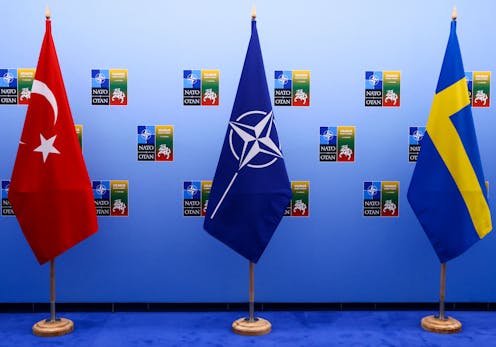What's on the agenda as Biden heads to NATO summit: 5 essential reads as Western alliance talks expa
Leaders of the Western military alliance meet in Lithuania with the ongoing war in Ukraine as a backdrop.

Leaders of the nations comprising NATO will meet for a two-day summit beginning on July 11, 2023.
The gathering in the Lithuanian capital, Vilnius, comes at a pivotal moment for the Western security alliance – it is seeking to expand membership and confront challenges ranging from the ongoing war in Ukraine to a perceived growing military threat from China.
No doubt NATO members will want to present a united front at the meeting. But on a number of key issues, not everyone is in agreement. Here are some of the issues likely to be discussed and debated during the leaders’ summit.
1. A pathway to Ukraine membership?
With war in Europe the obvious backdrop to the summit, much talk will be about Ukraine. NATO members have been aiding Kyiv individually, through the supply of arms and aid. And the military alliance has been assisting through nonlethal support, such as medical supplies and training. But, as noted by Mark Webber, professor of international politics at the U.K.‘s University of Birmingham, what many in Kyiv really want is full membership: “The bigger prize for Ukraine, however, is NATO membership. That would bring the country within the collective defense provisions of Article 5 of the North Atlantic Treaty and, in effect, extend U.S. – and U.K. – nuclear guarantees to Ukrainian territory.”
Webber noted that accommodating Ukrainian President Volodymyr Zelenskyy’s request for “expedited” membership of the alliance will be difficult. “No one in NATO is arguing in favor of granting membership while Ukraine remains at war. Beyond that, the allies are divided.”
2. What about Sweden?
The NATO leaders’ summit will be the first at which the members present will include Finland, which joined in April. Fellow Nordic state Sweden would like to be next, perhaps even officially becoming the group’s 32nd member at the Vilnius meetup. But Sweden’s ascension continues to be blocked by NATO member Turkey.
Turkey’s recently reelected leader, Recep Tayyip Erdoğan, is holding out – as he had done with Finland – until he gets the reassurances he says he needs that the Swedish government will crack down on what he describes as Kurdish “terrorists” being “harbored” in Sweden. There are also suggestions that Erdoğan views Sweden’s ascension to NATO conditional on Turkey’s own bid to join the European Union.
Ronald Suny, a historian at University of Michigan, noted that Erdoğan is acting largely out of domestic concerns – international pressure on the Kurdistan Workers’ Party, or PKK, fits his agenda of suppressing Kurdish rights in Turkey. But it also highlights an underlying problem the alliance is facing:
“NATO is supposed to be an alliance of democratic countries. Yet several of its members – notably Turkey and Hungary – have moved steadily away from liberal democracy toward ethnonational populist authoritarianism,” Suny wrote. “Finland and Sweden, on the other hand, fulfill the parameters of NATO membership more clearly than several of the alliance’s current members. As the United States proclaims that the war in Ukraine is a struggle between democracy and autocracy, Turkey’s opposition to the Nordics who have protested its drift to illiberalism are testing the unity and the ideological coherence of NATO.”
Read more: Why Turkey isn't on board with Finland, Sweden joining NATO – and why that matters
3. The benefit of being a NATO member
But why would Finland, Sweden, Ukraine and any other country look to join NATO? John Deni at American University School of International Service explained that Article 5 of the alliance’s treaty calls for collective action should any member be attacked.
“Article 5 really is the heart and soul of the NATO alliance. It is the part of the treaty that says that if one member is attacked, then all of the other members will treat it as an attack on them all. In effect, it calls for a collective response once requested by any of the current 30 members of NATO and invoked by the entire alliance,” he wrote.
But that doesn’t necessarily mean that the U.S. would have to mount a military response should an ally be attacked. “Article 5 was written in such a way that it allows each ally to decide for itself the best course of action to take – there is no prescribed response once the article is invoked,” Deni added.
4. The end of the neutral option?
As Finland’s and Sweden’s desire to join NATO shows, smaller nations traditionally seen as aspiring to neutrality are, in the words of University of Michigan’s Ronald Suny, “recalculating how they fit into this renewed division of the world.”
Suny noted that, with Finland’s entry into NATO and the possibility of once-neutral Sweden joining it, other states are questioning “the efficacy of nonalignment in a polarized world.”
“In its place, we have the ‘NATOfication’ of Eastern Europe – something that Putin unwittingly accelerated and which leaves Putin’s Russia with less accommodating neighbors,” Suny wrote.
Read more: Finland, NATO and the evolving new world order – what small nations know
5. A cluster bomb controversy
A last-minute area of controversy emerged as NATO leaders prepared to gather in Vilnius: cluster bombs.
On July 7, 2023, the Biden administration announced that it would supply Ukraine with the controversial munition, which scatters bomblets across a wide area. The problem is not all NATO countries are in agreement with the U.S. move. Germany, the U.K. and Canada – which are among the 120-plus countries that have signed an international treaty banning the use of cluster bombs – have all already expressed their misgivings.
Robert Goldman, a laws of war expert at American University, explained that the White House had previously shown hesitancy over selling cluster bombs to Ukraine in part because of the “optics” and over concerns that “it may introducing a wedge between the U.S. and other NATO countries.”
Goldman explained that there is no law preventing the U.S. providing cluster bombs to the Ukraine or any other country. “Nonetheless, providing Ukraine with cluster weapons could serve to destigmatize them and runs counter to international efforts to end their use. And that, in turn, could encourage – or excuse – their use by other states that may be less responsible,” he argued.
Read These Next
AI’s growing appetite for power is putting Pennsylvania’s aging electricity grid to the test
As AI data centers are added to Pennsylvania’s existing infrastructure, they bring the promise of…
Why US third parties perform best in the Northeast
Many Americans are unhappy with the two major parties but seldom support alternatives. New England is…
From moral authority to risk management: How university presidents stopped speaking their minds
Nearly 150 universities and colleges have adopted institutional neutrality pledges since 2023.






